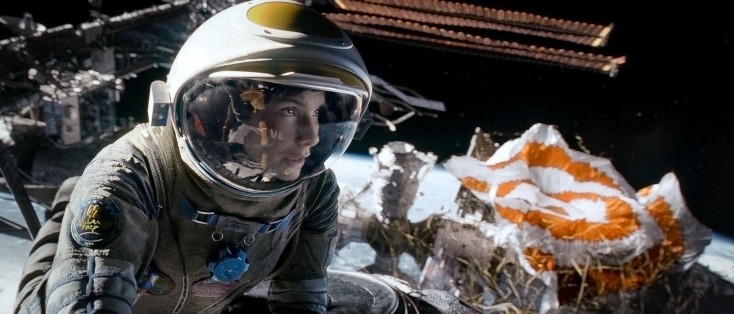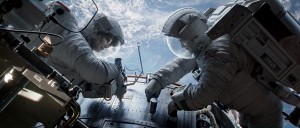By ANGELA DAWSON
Front Row Features
HOLLYWOOD—In preparation for her role in “Gravity,” in which she plays a scientist on a space mission that goes awry, Academy Award winner Sandra Bullock (“The Blind Side”) believed she needed to speak to someone who actually had been in space and had experienced weightlessness.
It wasn’t like she could just call NASA and ask for an astronaut. Instead, she was able to make a connection through an unlikely source—her brother-in-law.
As it turns out, her sister’s husband had met someone at a party who was related to astronaut Catherine “Cady” Coleman, who had logged more than 4,330 hours in space aboard the Space Shuttle Columbia and the International Space Station. Though they’re conversation was brief, Bullock got a sense of what it was like to be in space from Coleman.
The 49-year-old actress, who is busy juggling motherhood (as an adoptive mom to Louis, who will be three in January) and her career, recently spoke about taking on the dramatic role, in which she co-stars with George Clooney. Bullock is pleased that her part, written specifically for a woman by director Alfonso Cuaron (“Children of Men,” “Harry Potter and the Prisoner of Azkaban”) and his son Jonas Cuaron, is one that is a departure for the usually comedic actress, and already has critics over the moon with her performance.
Q: Can you talk a little bit about what you had to do training-wise? How was it doing the green screen?
Bullock: If there had been a green screen, it would have been nice. There was just blackness or bright white lights or metallic objects. You retrain your body from the neck down to react and move as if it was in Zero G without the benefit of Zero G (weightlessness) moving your body, because everything your body reacts to with a push or a pull on the ground is completely different than it is in Zero G. To make that second nature just took training and just weeks of repetition and then syncing it with Alfonso’s camera and the mechanics and the mathematics of it all, and then just separating that from your head where you had to sort of connect to the emotion, and tell the emotional story. There were various contraptions that existed on the soundstages which I just made them my friend as quickly and as physically as I could because if I didn’t, they were so confusing and complex, I had to figure out how to communicate in a language that I’m not understanding coming at me.
Q: What was your reaction when you first saw the final cut of the film?
Bullock: The first time I saw it all put together was in Venice (at the film festival). When an actor sees herself for the first time, you spend all your time just watching yourself and hating yourself and picking your performance apart, saying, “I look horrible, I should quit.” There was no time to pick apart one’s performance because you were inundated with the extreme beauty and emotion that (Cuaron) created visually. I hate using the world technologically because it sounds like it’s an inanimate object. Technology is something that’s heady. It was turned into such an emotion and such a visceral, physical experience in this movie. I don’t know how they did it with sound, coming behind your head. All of a sudden, you found yourself affected in ways you were not planning on being affected. George and I both had the same reaction. We went “Wow.” I mean you can’t really speak after the film is over. So I was lucky enough to finally be able to view a movie I was in as it was supposed to be viewed—as a newcomer.
Q: How did you and Alfonso get along?
Bullock: We were on sort of similar paths in life and how we looked at things and events and the unknown. We didn’t know why we were there; we were just sort of going “OK, how do you deal with that?” We went into the technological side and we went “Wow, I don’t know how I’m going to pull this off.” and I met Jonas (Cuaron) and I said, “Wow, his son, his co-writer, is There’s a sense of calm and understanding that always exactly the same. There were times he would come to my trailer at the end of the day and I knew why he was coming. All of our priorities were the same in that we were all stepping into a completely unknown world. (The Cuarons) had been in it far longer then I was. I had to play catch up.
Q: Is it a challenge to pick roles now that you are a mother of a young son?
Bullock: The important thing for me was, I can’t selfishly take journeys any more because I have to take a little boy (Louis) along with me. I said “If you make it an amazing experience for him and make it so that I’m not somewhere not paying attention,” because I’m so worried about where is he. Is he having fun? Is this a good life experience? And David (Hayman, the producer) turned the back lot and a soundstage in rainy London into a wonderland for a 1-½ year old. Everything was bumper-guarded. People would say, “What is that?” and I’d say, “That is to protect a child’s head.” So there was just a level of kindness and collaboration and I think the general sense of the unknown bonded everyone together on such a human level. If you have an experience, it spoils you. It ruins it for a lot of other people, and I can say that honestly happened.
Q: Were you concerned about carrying the weight of the movie on your shoulders because you’re pretty much on screen by yourself for most of it?
Bullock: I’ve never thought about how I was the only person on screen. You had the story, the elements that Jonas and Alfonso wrote. The technology was a constant character around you—the visuals. I always went back to “What was in their heads that I need to honor and help execute.” I never once thought, “I’m the only person,” because there’s George (Clooney), who’s a vital part of this film. He represents life and this outlook on living. If you don’t have that, this film couldn’t exist. I didn’t write this or produce it or come up with the cockamamie idea to make a space movie. (She laughs.) I still don’t think about it because I’m third or fourth on the list after the story, the emotional visuals, the sounds and he experience of what (the Cuarons) created.
Q: What research did you do for the role?
Bullock: We had a lot of technicians around us that helped me literally with knowing where buttons were in the (Russian and Chinese spacecrafts). I was more concerned with how my body was supposed to look in Zero-G. You have people explaining, “Well this is what happens,” and I go, “It’s not registering.”
Q: So how did you reach the point where you felt comfortable with what you were doing physically?
Bullock: My brother-in-law, a friend of his has a wine packaging place, and the guy says, “Yeah, my sister’s an astronaut.” And my brother-in-law said, “Well, my sister-in-law’s getting ready to be an astronaut.” So he got my number to Cady, who was at the ISS (International Space Station) at the time. She called so I was able to literally ask someone who’s experienced the things that I was trying to physically learn, and was able to ask her how the body works, and what do you do, and what do I need to reteach my body physically to do that cannot happen on earth. It was just a really coincidental, fortuitous thing that happened over wine that got me the final piece of information I needed.
Q: In speaking with a real astronaut, what fascinated you most about her job and the experiences she had?
Bullock: We had one phone conversation. Apparently, they aren’t allowed to accept calls whenever you feel like calling them, and our work schedules were so crazy. Our connection was always, sort of, ships passing in the night. My character isn’t an astronaut. She is just (a scientist) who happened to be in a position where it was easier to train her to execute this one mission and then go home. What I learned from them, which is so beautiful, is just their emotional point of view on life, and why they go up there.
Q: You had to go to some pretty dark places emotionally as a mom in this role. Was that difficult for you to do?
Bullock: Oh yeah. No one wants to think about that. I just kept thinking, “What a strange job.” I kept saying, “What would I do?” and I realized I might be far worse off than she is. You just have to go there and know that at the end of the day you can unplug. You can go home and do something that a lot of parents can’t.






